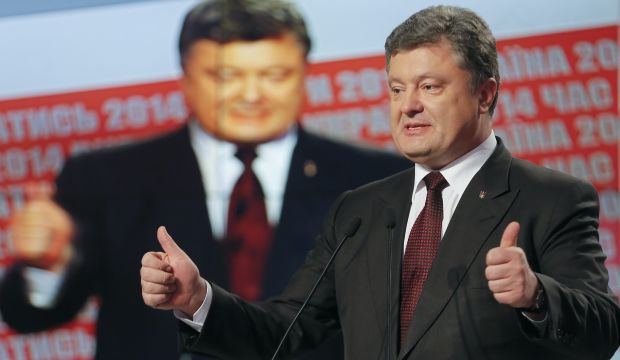
Ukrainian President Petro Poroshenko reacts during his briefing at a political party press center in Kiev, Ukraine, on October 26, 2014. (EPA/Sergey Dolzhenko)
Kiev, Bloomberg—Ukrainian parties that advocate firmer European ties rushed Monday to construct a coalition after sweeping aside the Russian-leaning political forces that hail from the nation’s war-ravaged east.
President Petro Poroshenko said negotiations that will include Prime Minister Arseniy Yatseniuk’s People’s Front and others should take no more than 10 days. Pro-European parties may have sufficient votes for a two-thirds constitutional majority, early results showed Monday. The Opposition Bloc of deposed leader Viktor Yanukovych’s allies got 9.8 percent.
Voting took place during a fragile truce in eastern Ukraine’s seven-month insurgency and tension between Russia, the US and the European Union over the nation’s future. Poroshenko, who brokered the September 5 ceasefire, is tackling the worst recession since 2009.
His coalition plans risk marginalizing the residents of the east that Russian President Vladimir Putin says need safeguarding.
“Pro-Western, pro-reform parties have taken a strong lead,” Liza Ermolenko, an analyst at London-based Capital Economics, said Monday in an emailed note. The parties of Poroshenko and Yatseniuk “may just be able to scrape enough votes for a parliamentary majority, although it’s also possible that a broader coalition may have to be formed.”
The People’s Front and Poroshenko’s bloc were neck-and-neck with 21.4 percent and 21.6 percent after 57.1 percent of ballots had been counted for party lists. Other pro-EU parties to pass parliament’s 5-percent entry hurdle included Samopomich, which got 11.2 percent, and ex-Premier Yulia Tymoshenko’s Batkivshchyna, which got 5.7 percent.
Ukrainians also voted Sunday for candidates—some backed by parties, some independent—in single-seat constituencies, which make up the other half of the legislature. Members of Poroshenko’s party were ahead in 64 of 198 races, the partial results showed.
Turnout was 52.4 percent, according to a final count.
Kent Harstedt, head of the Ukrainian observer mission of the Organization for Security and Cooperation in Europe, said the vote was competitive and largely met democratic standards. Even so, there was evidence of some candidates being intimidated, he said, without elaborating.
Opposition Bloc leader Yuriy Boiko called the election “the dirtiest ever with regard to the opposition—people frightened and followed around our representatives and activists.”
Poroshenko declined to name his preference for prime minister, saying lawmakers must decide. The People’s Front proposed Yatseniuk remain as head of the new government.
The showing for Yatseniuk’s party gives him “a very serious claim” to stay on as premier, according to Yuriy Yakymenko, head of the political department at the Razumkov Center for Economic and Political Studies in Kiev.
The People’s Front “are our main partners—we must be together for sure, but we’ll have offers open for many parties,” Poroshenko said Sunday. “I want us to carry out fundamental amendments to the Constitution, including changes toward decentralization.”
EU President José Manuel Barroso congratulated Ukrainians on Twitter for a “victory of democracy” and a pro-European agenda. The only “legitimate elections” in Ukraine are Sunday’s vote and a December 7 ballot for local leaders in areas of the two eastern regions not under separatist control, US Secretary of State John Kerry said October 14 in Paris.
While Russia recognized the elections, it also backs separate ballots in rebel-held areas.
Alexei Pushkov, head of the Russian lower house of parliament’s foreign affairs committee, said Poroshenko and Yatseniuk wanted to “subjugate Ukraine to foreign centers of influence” and make Ukraine “fully dependent on the US and to a lesser extent on the European allies of the US.”
Support for parties that sympathize with Russia has shriveled as the death toll in Ukraine’s east rose past 3,700. Rebels in control of districts in Donetsk and Luhansk prevented voting from taking place in 15 of 32 of the precincts there, according to the Central Electoral Commission.
The sound of shelling and large-caliber fire reverberated across the city of Donetsk Monday, the local council said on its website.
The Communist Party, whose deputies frequently backed Yanukovych, didn’t make it into parliament. Sergei Larin, an Opposition Bloc member, said his party will stick up for voters who aren’t represented by Ukraine’s current rulers.
“They’ve entrusted us with their voices as the opposition to the power which today does virtually nothing for the people,” he said, according to a statement.
Among lawmakers’ first tasks will be drafting the 2015 budget, with Ukraine facing an economic contraction of as much as 10 percent this year and the International Monetary Fund warning a 17 billion US dollar bailout may not be enough to keep the former Soviet republic of 43 million people afloat.
The administration that took over in February after street protests sank the previous regime has signed a delayed EU accord on political association, a step the demonstrators demanded to steer the nation away from its Soviet past.

Trackbacks/Pingbacks